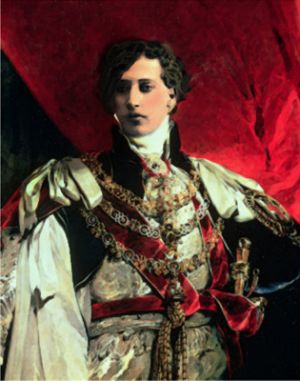William, Duke of York
William, Duke of York (1785-1840), was the second child and oldest son of Henry VII of England and Scotland. He became Prince Regent of England and Scotland in 1822 following the abdication of his elder sister Mary. A man who combined considerable charm and sophistication with a tendency towards overindulgence, he was never close to his niece, Victoria. This was in sharp contrast to his younger brother Henry, Duke of Edinburgh (born 1770, died 1833), a professional soldier who saw action in the Peninsular Wars. Most historians agree that Duke Henry was a surrogate father to the young Queen, and it is no surprise that his own values of hard work, rigid moral codes and a firm belief in the sanctity of marriage became a hallmark of her life. His death in 1833 devastated her, although it was at his lavish state funeral that she met Albert de la Pole, grandson of the Earl of Suffolk--the man who would be her husband.
The Regency itself was dominated by the nascent political party that had come to be known as the Whigs, in alliance/coalition with the Scottish political party called the Loyalists (or "Thistles"). The Prince Regent was more-or-less willing to follow where the coalition led. Although the Prince Regent himself had cool relations at best with young Queen, several members of the Cabinet took upon themselves to visit and befriend her. One of these--Lord Melbourne--became something of a mentor to her.
But the Regency was also marked by scandal involving the Duke of York's unhappy marriage to Caroline of Brunswick (born 1770, died 1831), a match arranged by Henry VII. The Duke's open adultery alienated many, including Victoria insomuch as she understood what was happening. She herself quite liked her Aunt Caroline and felt it deeply when divorce proceedings against the Duchess resulted in massive evidence of her own unfaithfulness. Victoria was not allowed to attend Caroline's funeral, a fact for which she never forgave her uncle. Evidently, she also blamed him for thwarting nearly every opportunity to see her parents or brother, although he actually had little to do with the matter.
At any rate, the political period of the Regency (as opposed to the cultural one) came to close with the so-called "double event." Upon Victoria's eighteenth birthday, she proposed to Albert de la Pole who accepted. By now Lord Melbourne had risen to First Lord and he aided the transition as much as possible, not least because the Prince Regent's debts had proven disasterous.
William, Duke of York, was present at the coronation of his niece but afterwards she had as little as possible to do with him. He withdrew from private life and it is likely became addicted to laudenum.
It was a source of some friction that Victoria's heir, Albert bore a startling resemblance to her uncle.

